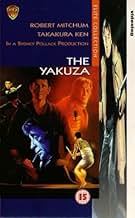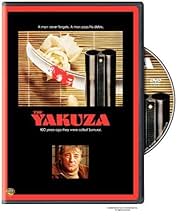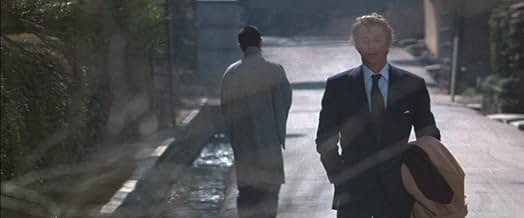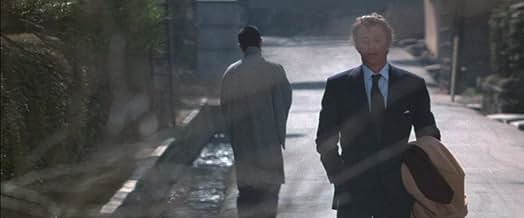American private-eye Harry Kilmer returns to Japan to rescue a friend's kidnapped daughter from the clutches of the Yakuza.American private-eye Harry Kilmer returns to Japan to rescue a friend's kidnapped daughter from the clutches of the Yakuza.American private-eye Harry Kilmer returns to Japan to rescue a friend's kidnapped daughter from the clutches of the Yakuza.
- Director
- Writers
- Stars
Ken Takakura
- Ken Tanaka
- (as Takakura Ken)
Eiji Okada
- Toshiro Tono
- (as Okada Eiji)
Keiko Kishi
- Eiko Tanaka
- (as Kishi Keiko)
Kyôsuke Machida
- Jiro Kato
- (as Kyosuke Machida)
Eiji Gô
- Shiro 'Spider' Tanaka
- (as Go Eiji)
- Director
- Writers
- All cast & crew
- Production, box office & more at IMDbPro
Featured reviews
Harry Kilmer is a retired detective whiling away his days at the beach in Malibu. An old friend named George Tanner contacts him with a problem: his daughter has been kidnapped by the Yakuza, with whom Tanner was conducting business. Harry is dispatched to Tokyo to get her back, and while there rekindles his relationship with Eiko, a woman he once loved. For help with his mission, Harry calls upon Eiko's estranged brother Ken, who has an obligation to him- or giri- for coming to Eiko's aid years before. As they battle the Yakuza, Harry comes to realize that Ken and Eiko's relationship is more complicated than he realized, and that he has his own giri he may never be able to repay.
Directed by Sydney Pollack, 'The Yakuza' is a stylish crime drama that entertains, though suffers from tonal and pacing issues galore. Originally written by Paul Schrader, it was intended as a vehicle for Lee Marvin under the direction of Robert Aldrich; though that film was never made. Instead, Pollock was hired to direct and Schrader's original script was considerably altered by Robert Towne. The end result is a film of contrasting styles, attempting- largely in vain- to balance Schrader's hard-edged original material with the romanticism of Pollock and Towne's approach.
Perhaps with Schrader's script in hand, a director like Aldrich- well versed in the art of making action pictures- could have captured the violent sequences in 'The Yakuza' with style and verve. With Towne's, Pollock doesn't, seeming more comfortable with dialogue heavy scenes and wistful set-pieces. More often than not, these feel ponderous and overly-expositional, with too much talking and not enough movement. In contrast, the way Pollock captures the violence seems rushed and cursory.
While we do empathize with the central three characters- Harry, Eiko and Ken- the rest are ill-defined, blurry caricatures one can't help but forget. The film does contain powerful moments, and arrives at a sensational conclusion, but the journey there is one fraught with issues. It is a shame the narrative and Pollock's approach to it is so muddled and uncertain, as there are brilliant sequences in 'The Yakuza'- and it's a triumph in many other respects.
Kôzô Okazaki's cinematography, for one, is exceptional. He shoots the thoroughfares of Tokyo strikingly, in a manner which heightens the city's neon-streaked coldness. Watching Harry somberly stalk the city's side-streets or graveyards is arresting, while the intricate lighting in interior shots captures one's attention and keeps it held. Dave Grusin's jazzy score is also worth mentioning, as it lends to proceedings an ambience of film-noir that feels most appropriate and atmospheric.
'The Yakuza' also boasts impressive performances from the cast that one would be remiss not to mention. Robert Mitchum stars as Harry, delivering one of the finest performances from the latter half of his career. Arguably one of the most naturalistic actors of all time, he never resorted to theatrics or seemed anything less than fully authentic. His performance here as Harry is thoughtful, powerfully understated and proof that less really does mean more when it comes to acting. How the Academy never recognized his greatness is frankly scandalous; as whether in 'The Yakuza' or anything else, Mitchum was always perfect.
His co-star Ken Takakura subscribes to the same playbook as he does, delivering a restrained, masterful performance of great subtlety and style. Starring as Ken, Takakura has a magnetic screen presence and an enigmatic gravitas; ensuring you'll be staring his way anytime he's on screen. Richard Jordan also does strong work as an associate of Harry's named Dusty, and Keiko Kishi is utterly beguiling as Eiko; sharing with Mitchum a very warm, seemingly authentic chemistry.
Sydney Pollock's 'The Yakuza' is an entertaining film, though it may have been better in the hands of a different director. While it has tonal issues and the dialogue is a little stilted in places, the cinematography from Kôzô Okazaki is captivating, and Dave Grusin's score is atmospheric. The performances are routinely brilliant too, with Mitchum and Ken Takakura doing especially fine work. Taking all that into account, while the saga of blood, love and honor that is 'The Yakuza' is well worth seeing; it is not a masterpiece.
Directed by Sydney Pollack, 'The Yakuza' is a stylish crime drama that entertains, though suffers from tonal and pacing issues galore. Originally written by Paul Schrader, it was intended as a vehicle for Lee Marvin under the direction of Robert Aldrich; though that film was never made. Instead, Pollock was hired to direct and Schrader's original script was considerably altered by Robert Towne. The end result is a film of contrasting styles, attempting- largely in vain- to balance Schrader's hard-edged original material with the romanticism of Pollock and Towne's approach.
Perhaps with Schrader's script in hand, a director like Aldrich- well versed in the art of making action pictures- could have captured the violent sequences in 'The Yakuza' with style and verve. With Towne's, Pollock doesn't, seeming more comfortable with dialogue heavy scenes and wistful set-pieces. More often than not, these feel ponderous and overly-expositional, with too much talking and not enough movement. In contrast, the way Pollock captures the violence seems rushed and cursory.
While we do empathize with the central three characters- Harry, Eiko and Ken- the rest are ill-defined, blurry caricatures one can't help but forget. The film does contain powerful moments, and arrives at a sensational conclusion, but the journey there is one fraught with issues. It is a shame the narrative and Pollock's approach to it is so muddled and uncertain, as there are brilliant sequences in 'The Yakuza'- and it's a triumph in many other respects.
Kôzô Okazaki's cinematography, for one, is exceptional. He shoots the thoroughfares of Tokyo strikingly, in a manner which heightens the city's neon-streaked coldness. Watching Harry somberly stalk the city's side-streets or graveyards is arresting, while the intricate lighting in interior shots captures one's attention and keeps it held. Dave Grusin's jazzy score is also worth mentioning, as it lends to proceedings an ambience of film-noir that feels most appropriate and atmospheric.
'The Yakuza' also boasts impressive performances from the cast that one would be remiss not to mention. Robert Mitchum stars as Harry, delivering one of the finest performances from the latter half of his career. Arguably one of the most naturalistic actors of all time, he never resorted to theatrics or seemed anything less than fully authentic. His performance here as Harry is thoughtful, powerfully understated and proof that less really does mean more when it comes to acting. How the Academy never recognized his greatness is frankly scandalous; as whether in 'The Yakuza' or anything else, Mitchum was always perfect.
His co-star Ken Takakura subscribes to the same playbook as he does, delivering a restrained, masterful performance of great subtlety and style. Starring as Ken, Takakura has a magnetic screen presence and an enigmatic gravitas; ensuring you'll be staring his way anytime he's on screen. Richard Jordan also does strong work as an associate of Harry's named Dusty, and Keiko Kishi is utterly beguiling as Eiko; sharing with Mitchum a very warm, seemingly authentic chemistry.
Sydney Pollock's 'The Yakuza' is an entertaining film, though it may have been better in the hands of a different director. While it has tonal issues and the dialogue is a little stilted in places, the cinematography from Kôzô Okazaki is captivating, and Dave Grusin's score is atmospheric. The performances are routinely brilliant too, with Mitchum and Ken Takakura doing especially fine work. Taking all that into account, while the saga of blood, love and honor that is 'The Yakuza' is well worth seeing; it is not a masterpiece.
Not only is this a good 70's gangster/action flick, it is also one of the few movies about Japan ever produced in the States that does not make too many mistakes about Japanese culture.
Ken Takakura puts in a great performance which is no surprise since he first became famous in Japan for acting in yakuza (gangster) movies.
Anyone who has ever tried to understand or explain the concept of "giri" should see this movie!
Ken Takakura puts in a great performance which is no surprise since he first became famous in Japan for acting in yakuza (gangster) movies.
Anyone who has ever tried to understand or explain the concept of "giri" should see this movie!
Superb East-meets-West movie, I suspect largely due to Schrader's insight. Takakura Ken's performance really steals the show, though all actors are more than capable; Mitchum gives a great performance again. Not a martial arts movie, but contains a katana showdown that I can watch over and over again without finding fault [more believable than anything you'll see in 'Kill Bill'].
The story is gorgeously convoluted, keeping it's secrets to the very end, in a fitting Japanese manner. Action scenes are relatively restrained, and the story tells how Mitchum's character finally comes to understand Takakura Ken's character, and his apparently icy antagonism. When can we see a DVD copy?!
The story is gorgeously convoluted, keeping it's secrets to the very end, in a fitting Japanese manner. Action scenes are relatively restrained, and the story tells how Mitchum's character finally comes to understand Takakura Ken's character, and his apparently icy antagonism. When can we see a DVD copy?!
The Yakuza introduced we occidentals to the term the Japanese use for their various crime families. Probably after the wide acceptance of both the Godfather films, the American public was ready to see what organized crime looked like in another culture.
La Cosa Nostra, the Mafia, all those phrases we use for Italian organized crime certainly had their rituals and traditions. But as we learn in watching this film they have nothing on the Yakuza.
Robert Mitchum plays a private detective who works both sides of the law back in the states and he's hired by crime boss Brian Keith to rescue his daughter who was kidnapped by one of the Yakuza crime families in lieu of a shipment of weapons Keith was supposed to deliver. Coming along with him is young Richard Jordan whose father was a friend of both Mitchum and Keith as backup.
The mission is accomplished, but Mitchum and Jordan find the situation is a whole lot more complex than they were led to believe. In addition Mitchum gets involved with an old girl friend from the days when he was a military policeman during the postwar American occupation. She's the key to getting help from a former Yakuza member in their quest.
The American actors perform well here and oriental players James Shigeta and Japanese film star Takakura Ken are well cast as feuding Yakuza brothers. You will not question why Takakura Ken is known as the Japanese Clint Eastwood after seeing The Yakuza.
Director Sydney Pollack shows a real reverence and respect for the traditions of another culture. The Yakuza is both entertaining and informative and should not be missed.
La Cosa Nostra, the Mafia, all those phrases we use for Italian organized crime certainly had their rituals and traditions. But as we learn in watching this film they have nothing on the Yakuza.
Robert Mitchum plays a private detective who works both sides of the law back in the states and he's hired by crime boss Brian Keith to rescue his daughter who was kidnapped by one of the Yakuza crime families in lieu of a shipment of weapons Keith was supposed to deliver. Coming along with him is young Richard Jordan whose father was a friend of both Mitchum and Keith as backup.
The mission is accomplished, but Mitchum and Jordan find the situation is a whole lot more complex than they were led to believe. In addition Mitchum gets involved with an old girl friend from the days when he was a military policeman during the postwar American occupation. She's the key to getting help from a former Yakuza member in their quest.
The American actors perform well here and oriental players James Shigeta and Japanese film star Takakura Ken are well cast as feuding Yakuza brothers. You will not question why Takakura Ken is known as the Japanese Clint Eastwood after seeing The Yakuza.
Director Sydney Pollack shows a real reverence and respect for the traditions of another culture. The Yakuza is both entertaining and informative and should not be missed.
I have to agree with the preponderance of viewers here who rate this as a neglected classic of the 70's. All aspects of the film - performances, script, and direction - raise this to the level of greatness. This is certainly among Mitchum's greatest performances - his subdued, world-weary toughness undergirds the movie. The story as has been noted, is a rich and multilayered one with a sadness that aspires to and quite nearly reaches the level of tragedy. It also must be noted that this is one of the most effective portrayals of Japanese culture on celluloid. The movie does not shrink from violence; the various scenes of assassination and slaughter could have been done by Peckinpah. The movie deserves a restoration and should be brought to tv in letterbox mode. (Are you listening, Turner Classic Movies?)
Did you know
- TriviaMartin Scorsese wanted to direct after Mean Streets (1973), but the producers wanted Sydney Pollack. Scorsese is on record that he would very much have liked to direct the film and was disappointed that he was passed over. However, he got to direct Alice n'est plus ici (1974) instead after being sought out by Ellen Burstyn. "Alice" ended up making more than 20 times its budget and won Burstyn an academy award, while this film became a box office bomb.
- GoofsThe plane that Kilmer is boarding at the end is a Boeing 707; the one shown taking off in the last scene is a 727.
- Alternate versionsFor the Spanish Castilian version all the dialogues were dubbed to Spanish, even the Japanese lines.
- ConnectionsFeatured in ...Promises to Keep (1974)
- How long is The Yakuza?Powered by Alexa
Details
Box office
- Budget
- $5,000,000 (estimated)
- Runtime1 hour 52 minutes
- Sound mix
- Aspect ratio
- 2.39 : 1
Contribute to this page
Suggest an edit or add missing content






























